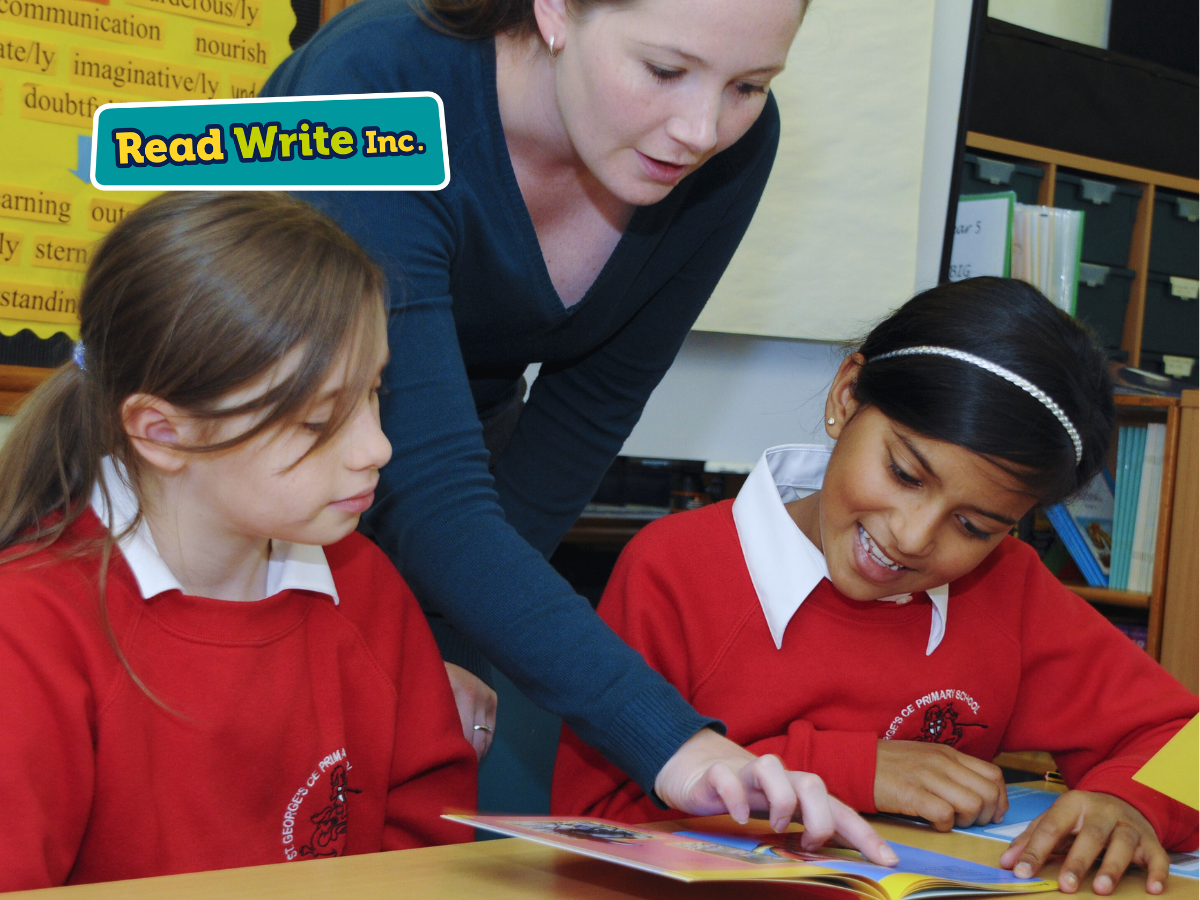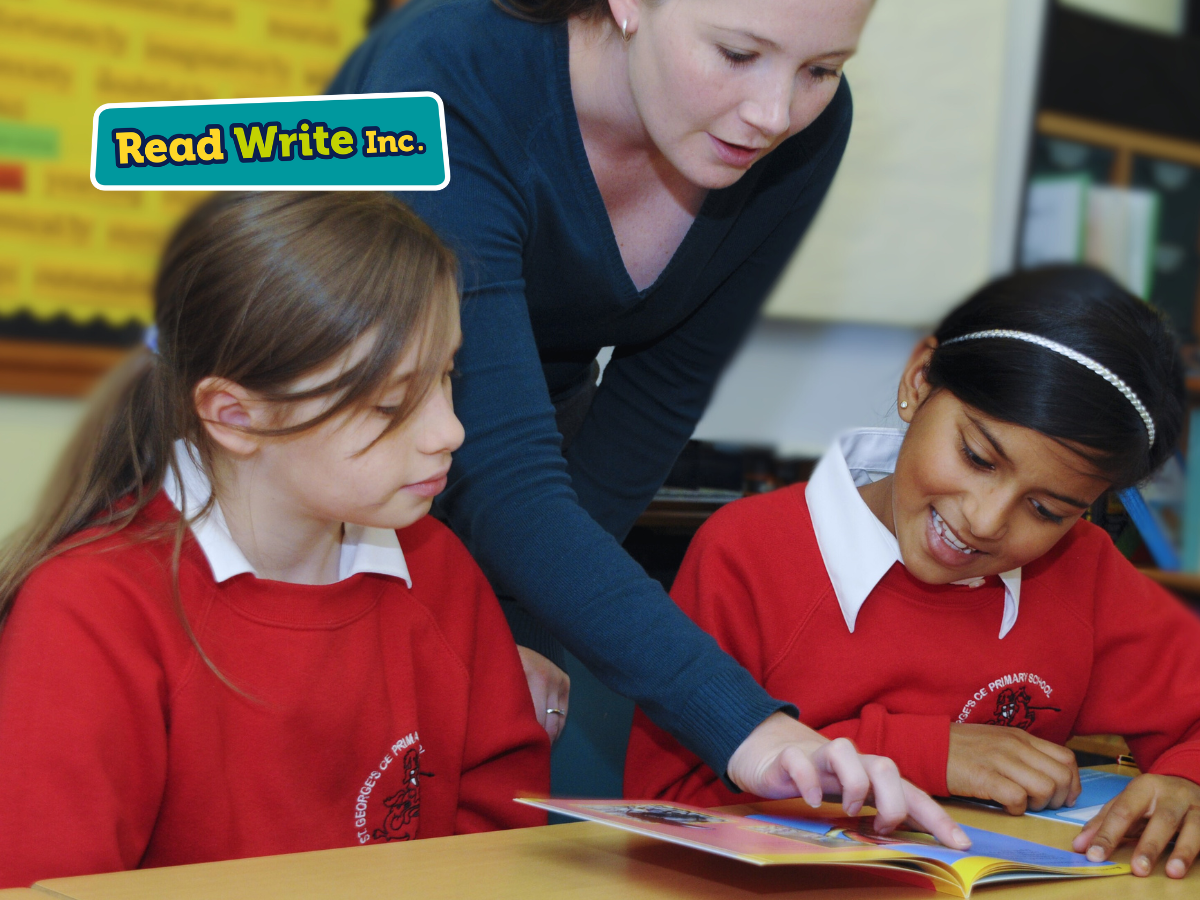For more than 20 years, Read Write Inc. has provided a proven framework to help all children learn to read, whatever their background. Here we look at 5 of the important themes of the most recent Reading Framework and show how closely the Read Write Inc. programmes already align to these principles.
1. Focus on and prioritise the children who can’t read
Read Write Inc. Phonics ensures teachers can identify quickly children who are at risk of falling behind, from the start of Reception/Primary 1. The RWI Phonics Fast Track Tutoring Handbook along with the Phonics Fast Track Tutoring training films on the Ruth Miskin Training online subscription (see www.ruthmiskin.com) provide detailed one-to-one tutoring guidance for children making the slowest progress, to accelerate their progress and ensure no child is left behind.
The aim is to keep all children up from the beginning of Reception/Primary 1, so they don’t need catch up later – ‘keep up, not catch up!’
Read Write Inc. Fresh Start is an award-winning catch-up phonics programme proven to support struggling readers at KS2. Resources include levelled Modules linked with full-colour Anthologies to enable students to catch up with reading quickly.
2. Word reading is nothing without fluency
Developing children’s reading fluency is essential for them to be able to comprehend what they are reading. If they read too slowly and have to continue to sound out word it is difficult for them to hold a whole sentence in their head makes comprehension difficult and reading unengaging.
Children read each Read Write Inc. Phonics Storybook three times. On the first read, children focus on accurate word reading; the second, on developing fluency and children reading more words at a glance; and the third, on comprehension. Fluency and comprehension increase with each repeated reading.
In addition to the Core Storybooks in Read Write Inc. Phonics, there are 60 More Storybooks from Green to Grey level which provide a breadth of practice at each level for consolidation and to help children develop reading fluency.
Children need to practise what they can already read. Children take home ‘a last and a past’ Storybook once they have read the story three times in school with their partner. The children enjoy re-reading stories they know well and showing their parents/carers how well they can read. Their fluency improves on every read.
3. Sharing and talking about books is important for children of all ages
Alongside daily phonics lessons, Read Write Inc. schools timetable a story every day, in every year group, to be read aloud. Teachers talk about stories with children to help them develop a love of books.
Being read to is the most powerful predictor of a child’s future reading comprehension.
This ensures children encounter high quality literature outside of their phonics lessons and that their oral comprehension, knowledge of stories and vocabulary grows.
4. Comprehension is an outcome, not a skill to practise
In Read Write Inc. Phonics, comprehension is particularly focused on when children read their Storybook for the third time. The teacher models how to read the story by thinking out loud about what is happening and how the characters are feeling. Children also discuss the story and the characters’ feeling with their partners. Teachers use ‘voice choice’ showing the children how they use an appropriate tone of voice to match a situation or how a character is feeling. In addition, there are Questions to talk about at the end of each story. Children respond using ‘Fastest finger first’ where they look for the evidence on the page and ‘Have a think’ where they have to justify their answers. In the Storybooks at Yellow, Blue and Grey levels there is also a ‘Questions to read and answer’ activity which children do with their partners where children find the answers in the text.

The Read Write Inc. Comprehension programme follows on from Read Write Inc. Phonics and is a series of weekly Modules for children in Year 2 who have completed Read Write Inc. Phonics and in Year 3. The programme has 20 Modules which include a range of fiction and non-fiction texts. It develops children’s reading fluency, comprehension of, and response to, fiction and non-fiction texts and aims to improve children’s writing by developing their vocabulary, grammar and spelling knowledge.
5. Vocabulary knowledge is vital for reading … and vice versa
Children on the Read Write Inc. Phonics programme can use adventurous vocabulary in their writing because they have encountered such language in their reading and they have talked about what the words mean. Some words are illustrated in the Storybook files on the Read Write Inc. Phonics Online subscription on Oxford Owl. In Yellow, Blue and Grey Storybooks, some words are explained in the Vocabulary Check on p.7.

Story Green Words
Story Green Words are low frequency words with sounds the children have been taught. They include names and words that are particular to the Storybook. They give children practice in decoding unfamiliar words and learning new vocabulary.

The Build a Sentence activity in the Get Writing! Books introduces ideas and vocabulary ready for the main writing task. In Yellow, Blue and Grey levels, children write down their rehearsed sentence. The Vocabulary activity in the Get Writing! Books enables children to learn new and interesting vocabulary to use in their writing at Blue, Grey and Yellow levels. Teachers clarify children’s understanding of the new vocabulary before they complete the activity.
In addition to the Talk Through Stories resource on the RMT Online Subscription, there is a twice termly resource that you can find in the Storytime and Poetry Time section of the Read Write Inc. Phonics Online subscription on Oxford Owl. It provides ideas for developing a deep comprehension of traditional tales and poetry and how to enrich children’s vocabulary.
For more information about Read Write Inc. Phonics
Book an appointment
Read more from Oxford Primary Literacy:
- Getting started with ELS Progress: Phonics catch-up programme
- Everything you need to know about ELS Essential Spelling
- How to get your classroom ready for Read Write Inc. Phonics
- DfE Reading Framework: 7 key take-aways for schools
- What’s next after Read Write Inc. Phonics?
- Helping you and your children prepare for the phonics screening check


